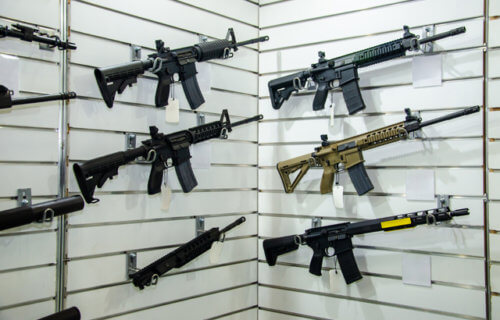SAN DIEGO, Calif. — There is perhaps no subject more controversial in the United States than gun control. President Biden recently called for stricter federal bans on assault weapons, but new research indicates such a change would have a minimal immediate effect. Why? Researchers find most gun buyers and sellers wouldn’t bother to comply with the new law.
A team from the University of California San Diego’s Rady School of Management analyzed the impact of the 2016 Massachusetts Assault Weapons Ban Enforcement Notice to reach this conclusion. At that time, Massachusetts Attorney General Maura Healey issued a decree stating any and all new sales of AR-style rifles would be illegal under the state’s Assault Weapons Ban. For reference, the study finds consumers purchase millions of assault style rifles in Massachusetts on an annual basis.
Thanks to unprecedented access to local state firearm sales and licenses, study authors were able to discover that within just five days of the Massachusetts Enforcement Notice’s announcement, the sale of assault rifles actually increased by 560 percent!
The law did produce long term benefits
Study authors note that by 2017 sales did decline, dropping between 64 to 66 percent lower in comparison to prior years. So, while the new state law had long term benefits, researchers say it didn’t stop countless gun dealers and buyers from continuing to do business in the short term. Moreover, just like other states (Washington and Colorado), compliance among gun dealers and manufacturers in Massachusetts is entirely voluntary. Even if a gun shop was selling banned guns, local police would have no legal recourse.
“Our research suggests new firearm restrictions require enforcement to gain full compliance,” says study co-author Kenneth C. Wilbur, professor of marketing and analytics at the Rady School, in a university release. “If the market complied fully with the Enforcement Notice, then assault rifle sales should have been zero in 2017. The data clearly show that not all firearm sellers and buyers complied with firearm restrictions. In fact, they directly reported their own noncompliance to the state government.”
Study authors made it a point to explain that the 2016 Massachusetts enforcement notice was originally formulated “to close an important loophole” created by Massachusetts’ first assault weapons ban put in place in 1998. That original law outlawed copies or duplicates of illegal assault rifles capable of rapid fire and rapid reloading. Examples include the Colt AR-15 and the Kalishnikov AK-47.
“After the 1994 federal assault weapon ban was enacted, gun manufacturers quickly introduced minor variations on the specific firearm products named in the ban, thereby apparently skirting the ‘copies and duplicates’ restriction,” study authors write. “AR-style rifles today are extremely popular—an estimated 1 to 2 million AR-style rifles were manufactured in 2016 with up to 15 million in circulation.”
Gun sales go up when gun owners fear strict bans
Perhaps the most eye-brow raising finding from this work is the initial jump in gun sales sparked by a law intended to produce the opposite effect. Researchers speculate gun aficionados likely bought more firearms in response to the new law over fears of a much stricter, all-encompassing gun ban in the future.
“The Massachusetts Enforcement Notice was seen as a surprise,” Wilbur notes. “Our research suggests that if a politician or a regulatory body wants to restrict weapons, they should design both their policy changes and their communications about their policy changes very carefully.”
“We see a direct correspondence in increased gun sales following mass shootings. Most of that is probably driven by purchaser concern about new weapon restrictions. Manufacturers both benefit from those concerns and also actively promote them. Policymakers also need to be proactive in communicating their message on the topic clearly to constituents,” he continues.
It’s important to note that this work wouldn’t have been possible without the Massachusetts Department of Criminal Justice agreeing to comply with researchers’ Freedom of Information Act public records requests. Similar requests were made in California, but ultimately denied.
“More and better scientific analyses will become possible if more jurisdictions collect and disseminate privacy-compliant firearm sales data,” the study concludes. “This can be done at the state, county, city or even retailer level. Just as data on the spread of COVID has been critical to shaping policies during the pandemic, we need more and better firearm research if we hope to have evidence-based firearm policy.”
The study is published in the Journal of Empirical Legal Studies.

How interesting that gun sales go up when people fear strict laws. I want to buy a new gun this year for protection at home. I will find a reputable gun reloading equipment service locally as well.